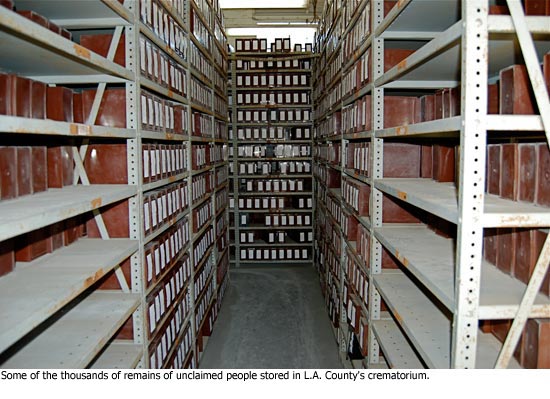A farewell to the lonely
December 9, 2010
Before dawn on Tuesday, the sad ritual began.
For ten straight hours, two veterans of L.A. County’s crematorium and cemetery solemnly filled a wide and deep grave with small plastic boxes containing the ashes of people whose bodies had gone unclaimed for more than three years. Back and forth the two men walked between the jam-packed storage shelves of the crematorium and the small cemetery just beyond its doors.
In all, they would respectfully and neatly stack 1,689 boxes in the ground. On the grave marker, there would be no names, no chiseled tributes to the deceased as being anyone’s beloved mother, father, husband or wife. The small stone would simply state the year of their passing—2007.
The core mission of Los Angeles County government is to provide for the poor and disadvantaged among us. We are their safety net—sometimes even in death. Over the decades, the county has buried the remains of thousands upon thousands of people whose bodies have gone unclaimed. Some of them, mostly the younger ones, may have died violently. Others lived long but, at the end, had no enduring ties and no one to grieve for them.
 So we, the people, give them the dignity they deserve in a graveside service east of the Civic Center, near County-USC Medical Center, the public hospital where a good number of them spent their final days.
So we, the people, give them the dignity they deserve in a graveside service east of the Civic Center, near County-USC Medical Center, the public hospital where a good number of them spent their final days.
For years, my colleague, Don Knabe, has reminded us during board meetings of these upcoming services, asking for a moment of silence to honor those who’ll soon be sharing a final resting place. This year was no different for Don, although the results were; a large media contingent showed up for the first time. I’m not sure why, but I’d like to think that, in these dire economic times, there’s a growing awareness of and empathy for those who are hurting.
“Their life was significant and important,” Father Chris Ponnet, director of spiritual care at County-USC, told this week’s gatherers. Prayers were read from Christian, Jewish and Islamic scriptures. These ceremonies, Father Ponnet said, “are a sign that society does not just throw away people just because they are unknown.”
“The blessing,” he said, “is that the county holds these services. The tragedy is that these people were disconnected from their families in the end.”
Our county aims to be one in which no single life is valued more than another, no matter what their lofty or lowly social status. This year, as I gather with family and friends to share the spirit of the holiday season, I’ll remember those 1,689 souls and be grateful for the many blessings in my life.
Posted 12/9/10














 405 bridge work causes a stink
405 bridge work causes a stink





